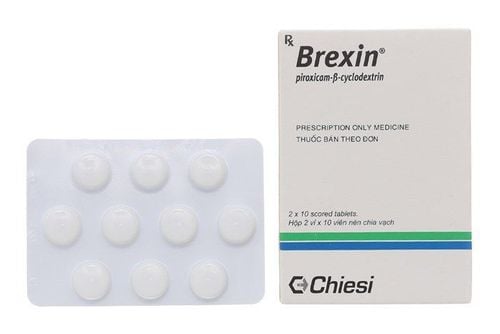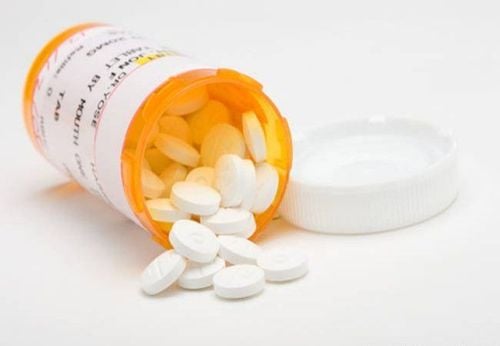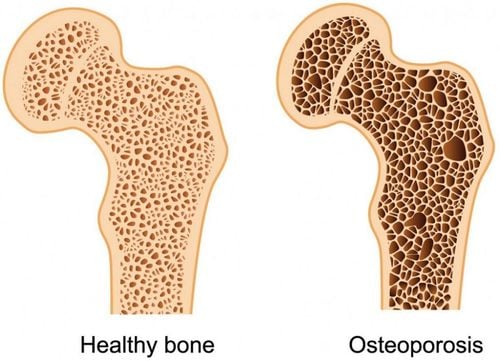This is an automatically translated article.
Gardan medicine is made in the form of tablets, with the main ingredient being Mefenamic acid. The drug is used to relieve pain and inflammation in a variety of conditions.
1. What is Gardan?
Each Gardan 500mg tablet has 500mg of mefenamic acid and other excipients as the main ingredient. Mefenamic acid belongs to the group of non-steroidal anti-inflammatory drugs, which have been shown to have anti-inflammatory, analgesic and antipyretic effects. The effect of the drug is due to its ability to inhibit cyclo-oxygenase formation of prostaglandins. Gardan is a non-narcotic drug.
Indications for use of Gardan:
Symptomatic relief of mild to moderate pain caused by rheumatoid arthritis (including idiopathic arthritis in children), soft tissue damage, other painful musculoskeletal conditions , headache, toothache, dysmenorrhea and postoperative pain. Contraindications to the use of Gardan:
Patients with a history of allergy to mefenamic acid or hypersensitivity to the drug's components; Patients with gastric - duodenal ulcer or inflammatory bowel disease; Patients with kidney failure, liver failure, severe heart failure; Patients relieve pain during coronary artery bypass surgery; Women who are pregnant or breastfeeding; People with cross-sensitivity to aspirin, other non-steroidal anti-inflammatory drugs (may cause allergic symptoms such as bronchospasm).
2. How to use and dose of Gardan
Usage: Orally. The patient should take the medicine while eating, along with plenty of water.
Dosage:
People 14 years and older: 500mg/time x 3 times/day. Or the first dose is 500mg, the next dose is 250mg/time, every 6 hours if needed; Duration of treatment: No more than 7 days. Overdose: Patients should not use Gardan in excess of the recommended dose, adhere to the correct treatment regimen because there have been some reports related to daily doses below 3g. Symptoms include: Headache, nausea, vomiting, diarrhea, epigastric pain, gastrointestinal bleeding, irritability, coma, disorientation, somnolence, fainting, ringing in the ears, occasional convulsions. In case of severe poisoning, the patient may experience acute kidney failure, liver damage.
When Gardan overdose, the patient should be treated symptomatically as required. Within 1 hour of ingestion of a potentially toxic dose, consider giving the patient activated charcoal. In adults, a doctor may recommend gastric lavage within 1 hour of an overdose if there is a potential for life-threatening illness. At the same time, it is necessary to ensure the patient's urine output, closely monitor liver and kidney function. Patients should be monitored for at least 4 hours after an overdose. In patients with frequent and prolonged seizures, intravenous diazepam should be used. Other interventions may be indicated depending on the clinical condition of the patient.
3. Side effects of the drug Gardan
When using Gardan, patients may experience the following side effects:
Digestive system: Peptic ulcer, perforation or gastrointestinal bleeding, nausea, vomiting, diarrhea, dyspepsia, flatulence, constipation, abdominal pain, vomiting blood, melena, peptic ulcer disease, aggravation of Crohn's disease and colitis, anorexia, enteritis, pancreatitis, raw stool; Blood and Lymphatic System: Anemia, hemolytic anemia, reduced red blood cell volume, bone marrow aplasia, thrombocytopenic purpura, transient leukopenia with risk of infection, disseminated intravascular coagulation, sepsis, granulocytopenia, eosinophilia, aplastic anemia, pancytopenia, thrombocytopenia; Immune system: Hypersensitivity reactions (asthma, exacerbation of asthma, dyspnea, bronchospasm, rash, skin pruritus, urticaria, angioedema, purpura, epidermal necrolysis, erythema multiforme) ; Nutrition and metabolism: Hyponatremia, glucose intolerance in diabetics; Psychiatric: Depression, confusion, nervousness, hallucinations; Nervous system: Headache, paresthesia, somnolence, dizziness, optic neuritis, aseptic meningitis (especially in people with autoimmune disorders such as systemic lupus erythematosus, mixed connective tissue disease) ), stiff neck, nausea, vomiting, disorientation, convulsions, insomnia, blurred vision; Eyes: Eye irritation, visual disturbances, reversible color blindness; Ear and Vestibular: Tinnitus, ear pain, dizziness; Cardiac/vascular: Hypertension, edema, heart failure, myocardial infarction, stroke, palpitations, hypotension; Respiratory: Shortness of breath, asthma; Hepatobiliary: Increased liver function test index, cholestatic jaundice, hepatitis, mild hepatotoxicity, hepatorenal syndrome; Skin and subcutaneous tissue: Laryngeal edema, angioedema, facial edema, erythema multiforme, bullous reactions (including Lyell syndrome and Stevens-Johnson syndrome), rash, sweating, hypersensitivity reactions to light, itchy skin, hives; Renal and urinary: Acute interstitial nephritis, allergic glomerulonephritis, hematuria, dysuria, nephrotic syndrome, proteinuria, non-oliguria renal failure, renal failure including renal papillary necrosis; Body as a whole: malaise, fever, fatigue, multi-organ failure; Laboratory: Positive tests for bile in the urine are due to the presence of the drug. If you experience any side effects while taking Gardan, you should immediately notify your doctor for support on appropriate management.
4. Be careful when using Garden
Before and while using Gardan, patients should note:
Gardan should not be used continuously for more than 7 days; Gardan is not recommended in pregnant women and nursing mothers; Gardan should be used with caution in patients with lactose-related metabolic disorders, impaired liver and kidney function; If you have a skin rash, diarrhea, liver dysfunction, hematopoietic disorders, ... or some other serious digestive disorders, the patient should stop taking Gardan and notify the doctor immediately; Caution should be exercised in concomitant administration of Gardan and non-steroidal anti-inflammatory drugs, including specific cyclo-oxygenase inhibitors; Prolonged use of any pain reliever to treat headaches can also make headaches worse. If you have ever had or suspect this condition, you should consult your doctor; Elderly people have a higher frequency of side effects from taking Gardan, especially the risk of perforation and gastrointestinal bleeding, which can lead to death; Gardan should be used with caution in people with existing or history of bronchial asthma because this drug can promote bronchospasm; The use of Gardan reduces the formation of prostaglandins dose-dependently, promoting renal failure. Patients at greatest risk are impaired renal function, heart failure, taking diuretics, liver dysfunction and the elderly. Renal function should be monitored in this group of patients; Appropriate supervision and counseling should be given when using Gardan for patients with a history of hypertension, mild to moderate congestive heart failure. Patients may have a slightly increased risk of arterial thrombotic events (myocardial infarction or stroke). Therefore, people with uncontrolled hypertension, ischemic heart disease, congestive heart failure, cerebrovascular disease or peripheral artery disease should only be treated with medication after careful consideration; Use Gardan with caution in people with risk factors for cardiovascular disease (hyperlipidemia, hypertension, smoking, diabetes), patients with cerebral hemorrhage and visceral bleeding; Perforation, ulceration, and gastrointestinal bleeding are possible risks while taking Gardan. Smoking and alcohol consumption are increased risk factors for these events. Combination therapy with a protective agent (proton pump inhibitor, misoprostol) may be considered, which should be considered for patients at risk of gastrointestinal bleeding (elderly) or those receiving concomitant low-dose aspirin or other medications. damage the digestive system; Persons with a history of gastrointestinal toxicity should report to their physician any unusual gastrointestinal symptoms, especially in the early stages of treatment; Caution should be exercised when using Gardan with drugs that may increase the risk of bleeding, gastric toxicity such as Warfarin, Corticosteroids, selective serotonin reuptake inhibitors, Aspirin; Gardan should be discontinued if the patient develops an ulcer or gastrointestinal bleeding due to taking the drug; Use of Gardan in patients with systemic lupus erythematosus or mixed connective tissue disorders may increase the risk of aseptic meningitis; Serious skin reactions (exfoliative dermatitis, Steven-Johnson syndrome, toxic epidermal necrolysis) may occur with the use of Gardan. The drug should be discontinued at the first signs of skin rash, mucosal lesions,...; Using Gardan can reduce fertility in women, so it is not recommended for women who are trying to become pregnant. In women who have difficulty conceiving or are undergoing infertility treatment, mefenamic acid can be discontinued; Use caution when taking Gardan to treat epilepsy; Patients with galactose intolerance, lapp lactase deficiency or glucose - galactose malabsorption should not use Gardan; Gardan should be used with caution in patients suspected of having poor metabolisers of CYP2C9; Contraindications to the use of Gardan in pregnant women and mothers who are breastfeeding; Gardan medicine can cause dizziness, drowsiness, so it is necessary to avoid taking the drug when driving or using machines.
5. Gardan drug interactions
Some Gardan drug interactions include:
Concomitant use of Gardan with other plasma protein-binding drugs may require dose adjustment; Gardan may increase the effects of anticoagulants such as Warfarin. If this drug and oral anticoagulants are used concomitantly, the prothrombin time should be carefully monitored. The combined use of Mefenamic acid along with Warfarin or Heparin is considered unsafe, unless under medical supervision; The drug Gardan reduces the renal clearance of Lithium, increases the concentration of lithium in the blood plasma. Therefore, patients should be carefully examined for signs of Lithium toxicity; Avoid concomitant use of Gardan and other non-steroidal anti-inflammatory drugs (including Aspirin) as this may increase the risk of side effects; Concomitant use of Gardan with selective serotonin reuptake inhibitors may increase the risk of gastrointestinal bleeding; Concomitant use of Gardan with antihypertensive drugs and diuretics will reduce the antihypertensive and diuretic effects. Diuretics may also increase the nephrotoxicity of Mefenamic acid; Concomitant use of Gardan with ACE inhibitors and angiotensin II receptor antagonists reduces the antihypertensive effect, increases the risk of renal failure (especially in the elderly). Patients should ensure adequate water supply for the body, check kidney function at the beginning and during the course of taking the drug; Concomitant use of Gardan with Aminoglycosides reduces renal function in susceptible patients, with decreased excretion and increased plasma concentrations of aminoglycosides; Concomitant use of Gardan with antiplatelet drugs will increase the risk of stomach ulcers, bleeding; Mefenamic acid (the main ingredient of the drug Gardan) interferes with the antiplatelet effect of aspirin when used concurrently, leading to the hindrance of aspirin prophylaxis in cardiovascular diseases; Concomitant use of Gardan with cardiac glycosides aggravates heart failure, reduces glomerular filtration rate and increases plasma concentrations of cardiac glycosides; Concomitant use of Gardan with cyclosporin increases the risk of cyclosporin nephrotoxicity; Concomitant use of Gardan with Corticosteroids increases the risk of bleeding, peptic ulceration; Gardan inhibits the metabolism of sulfonylurea drugs, leading to a prolonged half-life and an increased risk of hypoglycemia; Concomitant use of Gardan with Methotrexate leads to decreased excretion of these drugs, increasing drug concentrations; Gardan should not be taken for 8-12 days after taking Mifepristone because it may decrease the effect of mifepristone; Probenecid reduces the metabolism and excretion of the drug Gardan and its metabolites; Gardan may increase the risk of seizures if used in combination with the antibiotic Quinolone; There is a risk of systemic toxicity when Gardan is co-administered with Tacrolimus; Increased risk of hematologic toxicity (joint hematoma, hematoma) when Gardan is co-administered with zidovudine. During the use of Gardan, the patient should strictly follow all the instructions of the doctor on the way to use, the dose of the drug. In case of any unusual incident, the patient should notify the doctor as soon as possible to receive advice on the most appropriate response.
Please dial HOTLINE for more information or register for an appointment HERE. Download MyVinmec app to make appointments faster and to manage your bookings easily.













